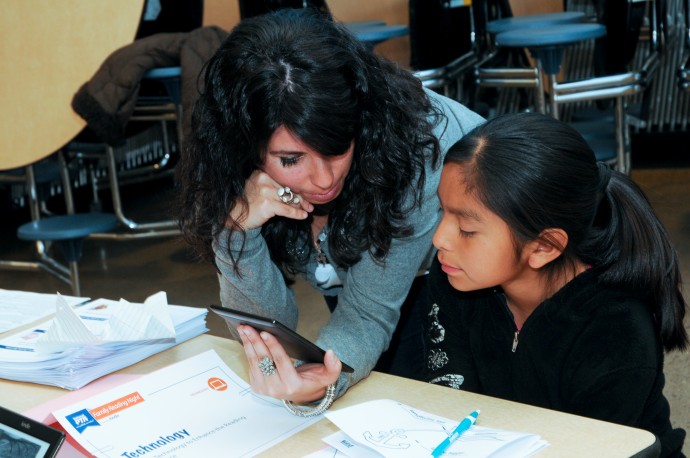In today’s world, parent engagement is becoming increasingly more important. With all of the distractions of life, it is easy to be sucked into other matters that seem to leave parental involvement on the back burner. This could be detrimental to the educational development of your child as well as the schools he or she attends.
Studies show that children whose parents/caregivers are active in their formal education tend to perform better than those who are not. This includes higher grades and test scores, positive attitudes and behavior in and about school and more effective schools as a whole.
Every parent wants their child to become a responsible, successful adult. Likewise, many parents also want to be included in their education, but just don’t know where to start, how to make the time or how to connect positively with the school.
We have compiled a list of ideas that you can use to help your child and their school come out on top. No matter what your life consists of, you are sure to find at least 1—or 100 ways to help.
Communicating
- Give positive feedback and show appreciation for teachers and the principal.
- Approach interactions with school administration and staff with a positive attitude and an open mind.
- Listen to other viewpoints when having a discussion.
- Share your child’s strengths, talents, and interests with teachers.
- Share expectations and set goals for your child with his or her teacher.
- Make appointments as needed to discuss your child’s progress or concerns.
- Attend parent-teacher conferences with specific questions you want to ask.
- Decide with your child’s teacher the best way to stay in touch (phone, e-mail, notes, etc.).
- Understand and reinforce school rules and expectations at home.
- Participate in informal opportunities to talk with and get to know school administrators, teachers, and other staff.
- Address concerns or questions honestly and openly.
- Attend PTA or parent meetings regularly.
- Read classroom and/or school newsletters.
- Visit your school’s web page.
- Know the names of your child’s teacher(s), school principal, and school nurse.
- Read and know your school’s handbook.
- Request that information be available in all languages spoken by school families.
- Share your family’s practices related to culture, values and parenting with your child’s school.
- Communicate your perceptions of how parents are treated and, when necessary, work with school staff to improve perceptions and school climate.
- Notify teachers of any significant changes that have taken place in a child’s life (such as death of a pet, family move, loss of income, family member’s illness, or divorce).
Parenting
- Meet your child’s friends and get to know their parents.
- Take advantage of family programs and resources offered at the school.
- Work with others to establish a parent resource center at the school.
- Help create a school toy/book lending library and visit it regularly.
- Assist in developing parent support programs/groups.
- Arrange to visit your child’s classroom or have lunch with your child at the school.
- Seek out classes or information on child development, learning styles, discipline, etc.
- Attend parent education fairs and other special events at school.
- Start a parent book club to discuss current publications.
- Help create and/or contribute to a school newsletter on parenting.
- Promote and volunteer for before- and after-school programs.
- Build an at-home child I.D. file including items such as medical records, pictures and fingerprints.
- Make donations and/or offer to work at clothing drives and food banks to benefit economically-disadvantaged families in the community.
- Ask teachers or school counselors about how to talk with your child about tough topics.
Student Learning
- Discuss your child’s school day and homework daily.
- Know your child’s academic strengths and weaknesses.
- Provide a quiet, well-lit place with basic school supplies for studying/homework.
- Help your child break down big homework projects into smaller, more manageable steps.
- Develop a consistent daily routine and time for studying and doing homework.
- Provide encouragement and praise for your child’s efforts.
- Share your interests, hobbies, and talents with your child.
- Provide your child with books, magazines, newspapers and other materials, and encourage regular reading.
- View selected TV programs together and then discuss them.
- Make family trips to the library, zoo, museum, or park a fun learning experience.
- Talk with your child’s teacher about creating home learning games and activities.
- Assist with homework, but avoid doing it for your child.
- Attend school meetings on learning expectations, assessments, and grading procedures.
- Help set goals and develop a personalized education plan for your child.
- Participate in activities that help you understand school technology.
- Help plan and attend family nights on improving study habits, doing homework, etc.
- Help develop, visit, or offer services to your school’s study/tutor center.
- Participate in academic fairs as a family.
Volunteering
- Respond to school surveys regarding your interests, talents and skills.
- Let school staff know your availability to volunteer (days, times and how often).
- Coordinate and participate in evening and weekend volunteer activities at school.
- Assist your child’s teacher in the classroom or on field trips when you are able.
- Work with school staff and teachers to develop volunteer activities you can do from home.
- Assist school staff and educators in creating a warm and welcoming atmosphere for parents.
- Help provide child care and/or transportation for volunteering parents.
- Collaborate to develop creative ways to use volunteers at school.
- Work with others to develop volunteer job descriptions and evaluations.
- Assist school staff in recruiting parents and community members as volunteers.
- Attend training and orientation on how to be an effective volunteer.
- Learn and uphold school discipline, confidentiality and other policies as a volunteer.
- Set a time to talk regularly with school staff and educators with whom you are working.
- Participate in organizing and planning ways to recognize and appreciate volunteers.
- Respond to school surveys/questionnaires on the effectiveness of volunteer programs.
- Help develop and distribute a volunteer directory to parents, school staff and teachers.
- Volunteer your consulting services in your areas of expertise to school staff or educators.
School Collaboration
- Learn about school and district policies and practices that affect children.
- Voice your support or concerns on any issue that will affect your family.
- Serve on school task forces that examine such things as school dress codes or bully prevention policies.
- Participate in meetings to determine special educational needs and services.
- Attend workshops on problem solving, conflict resolution and public speaking to develop your advocacy skills.
- Serve on school advisory councils or committees on curriculum and discipline issues.
- Become part of a school-based management team with teachers and the principal.
- Encourage and support children to serve in student leadership positions.
- Help your school create a student’s rights and responsibilities guide for families.
- Attend PTA, school board and/or town meetings, and speak to issues of concern.
- Learn candidates’ positions and participate in school board elections.
- Work with teachers and school administrators to develop a parent involvement policy.
- Write, call, or visit local or state decision makers to support or oppose proposed education legislation.
- Participate in petition drives or letter-writing campaigns to Congress regarding legislation affecting public schools and other child-related issues.
- Give testimony at public hearings in support of, or in opposition to, proposed education legislation.
- Vote in local, state and federal elections for public officials who support education.
Community Collaboration
- Find out about, and use information on, community resources and organizations.
- Help your school develop a directory of social and community services.
- Make local agencies and businesses aware of what’s happening at your school.
- Help coordinate and participate in events that support community groups.
- Talk with employers about holding parent meetings or parenting workshops on-site.
- Encourage employers to adopt flexible work schedules and time off so that employees might attend school functions.
- Ask employers and local businesses to make donations and support school programs.
- Help organize and/or participate in community health fairs.
- Recruit community members (seniors, business people) to volunteer at school.
- Become active in community groups such as YMCA and Boys and Girls Clubs.
- Serve on local community advisory councils and committees.
- Work with local authorities and public officials to sponsor or participate in community events.
- Help organize and/or participate in a community “clean up” or “beautification” project.
- Encourage and facilitate your child’s participation in community service.
- Be a role model; be active in community service, either by yourself or together with your child.
Communicating
- Give positive feedback and show appreciation for teachers and the principal.
- Approach interactions with school administration and staff with a positive attitude and an open mind.
- Listen to other viewpoints when having a discussion.
- Share your child’s strengths, talents, and interests with teachers.
- Share expectations and set goals for your child with his or her teacher.
- Make appointments as needed to discuss your child’s progress or concerns.
- Attend parent-teacher conferences with specific questions you want to ask.
- Decide with your child’s teacher the best way to stay in touch (phone, e-mail, notes, etc.).
- Understand and reinforce school rules and expectations at home.
- Participate in informal opportunities to talk with and get to know school administrators, teachers, and other staff.
- Address concerns or questions honestly and openly.
- Attend PTA or parent meetings regularly.
- Read classroom and/or school newsletters.
- Visit your school’s web page.
- Know the names of your child’s teacher(s), school principal, and school nurse.
- Read and know your school’s handbook.
- Request that information be available in all languages spoken by school families.
- Share your family’s practices related to culture, values and parenting with your child’s school.
- Communicate your perceptions of how parents are treated and, when necessary, work with school staff to improve perceptions and school climate.
- Notify teachers of any significant changes that have taken place in a child’s life (such as death of a pet, family move, loss of income, family member’s illness, or divorce).
Parenting
- Meet your child’s friends and get to know their parents.
- Take advantage of family programs and resources offered at the school.
- Work with others to establish a parent resource center at the school.
- Help create a school toy/book lending library and visit it regularly.
- Assist in developing parent support programs/groups.
- Arrange to visit your child’s classroom or have lunch with your child at the school.
- Seek out classes or information on child development, learning styles, discipline, etc.
- Attend parent education fairs and other special events at school.
- Start a parent book club to discuss current publications.
- Help create and/or contribute to a school newsletter on parenting.
- Promote and volunteer for before- and after-school programs.
- Build an at-home child I.D. file including items such as medical records, pictures and fingerprints.
- Make donations and/or offer to work at clothing drives and food banks to benefit economically-disadvantaged families in the community.
- Ask teachers or school counselors about how to talk with your child about tough topics.
Student Learning
- Discuss your child’s school day and homework daily.
- Know your child’s academic strengths and weaknesses.
- Provide a quiet, well-lit place with basic school supplies for studying/homework.
- Help your child break down big homework projects into smaller, more manageable steps.
- Develop a consistent daily routine and time for studying and doing homework.
- Provide encouragement and praise for your child’s efforts.
- Share your interests, hobbies, and talents with your child.
- Provide your child with books, magazines, newspapers and other materials, and encourage regular reading.
- View selected TV programs together and then discuss them.
- Make family trips to the library, zoo, museum, or park a fun learning experience.
- Talk with your child’s teacher about creating home learning games and activities.
- Assist with homework, but avoid doing it for your child.
- Attend school meetings on learning expectations, assessments, and grading procedures.
- Help set goals and develop a personalized education plan for your child.
- Participate in activities that help you understand school technology.
- Help plan and attend family nights on improving study habits, doing homework, etc.
- Help develop, visit, or offer services to your school’s study/tutor center.
- Participate in academic fairs as a family.
Volunteering
- Respond to school surveys regarding your interests, talents and skills.
- Let school staff know your availability to volunteer (days, times and how often).
- Coordinate and participate in evening and weekend volunteer activities at school.
- Assist your child’s teacher in the classroom or on field trips when you are able.
- Work with school staff and teachers to develop volunteer activities you can do from home.
- Assist school staff and educators in creating a warm and welcoming atmosphere for parents.
- Help provide child care and/or transportation for volunteering parents.
- Collaborate to develop creative ways to use volunteers at school.
- Work with others to develop volunteer job descriptions and evaluations.
- Assist school staff in recruiting parents and community members as volunteers.
- Attend training and orientation on how to be an effective volunteer.
- Learn and uphold school discipline, confidentiality and other policies as a volunteer.
- Set a time to talk regularly with school staff and educators with whom you are working.
- Participate in organizing and planning ways to recognize and appreciate volunteers.
- Respond to school surveys/questionnaires on the effectiveness of volunteer programs.
- Help develop and distribute a volunteer directory to parents, school staff and teachers.
- Volunteer your consulting services in your areas of expertise to school staff or educators.
School Collaboration
- Learn about school and district policies and practices that affect children.
- Voice your support or concerns on any issue that will affect your family.
- Serve on school task forces that examine such things as school dress codes or bully prevention policies.
- Participate in meetings to determine special educational needs and services.
- Attend workshops on problem solving, conflict resolution and public speaking to develop your advocacy skills.
- Serve on school advisory councils or committees on curriculum and discipline issues.
- Become part of a school-based management team with teachers and the principal.
- Encourage and support children to serve in student leadership positions.
- Help your school create a student’s rights and responsibilities guide for families.
- Attend PTA, school board and/or town meetings, and speak to issues of concern.
- Learn candidates’ positions and participate in school board elections.
- Work with teachers and school administrators to develop a parent involvement policy.
- Write, call, or visit local or state decision makers to support or oppose proposed education legislation.
- Participate in petition drives or letter-writing campaigns to Congress regarding legislation affecting public schools and other child-related issues.
- Give testimony at public hearings in support of, or in opposition to, proposed education legislation.
- Vote in local, state and federal elections for public officials who support education.
Community Collaboration
- Find out about, and use information on, community resources and organizations.
- Help your school develop a directory of social and community services.
- Make local agencies and businesses aware of what’s happening at your school.
- Help coordinate and participate in events that support community groups.
- Talk with employers about holding parent meetings or parenting workshops on-site.
- Encourage employers to adopt flexible work schedules and time off so that employees might attend school functions.
- Ask employers and local businesses to make donations and support school programs.
- Help organize and/or participate in community health fairs.
- Recruit community members (seniors, business people) to volunteer at school.
- Become active in community groups such as YMCA and Boys and Girls Clubs.
- Serve on local community advisory councils and committees.
- Work with local authorities and public officials to sponsor or participate in community events.
- Help organize and/or participate in a community “clean up” or “beautification” project.
- Encourage and facilitate your child’s participation in community service.
- Be a role model; be active in community service, either by yourself or together with your child.





